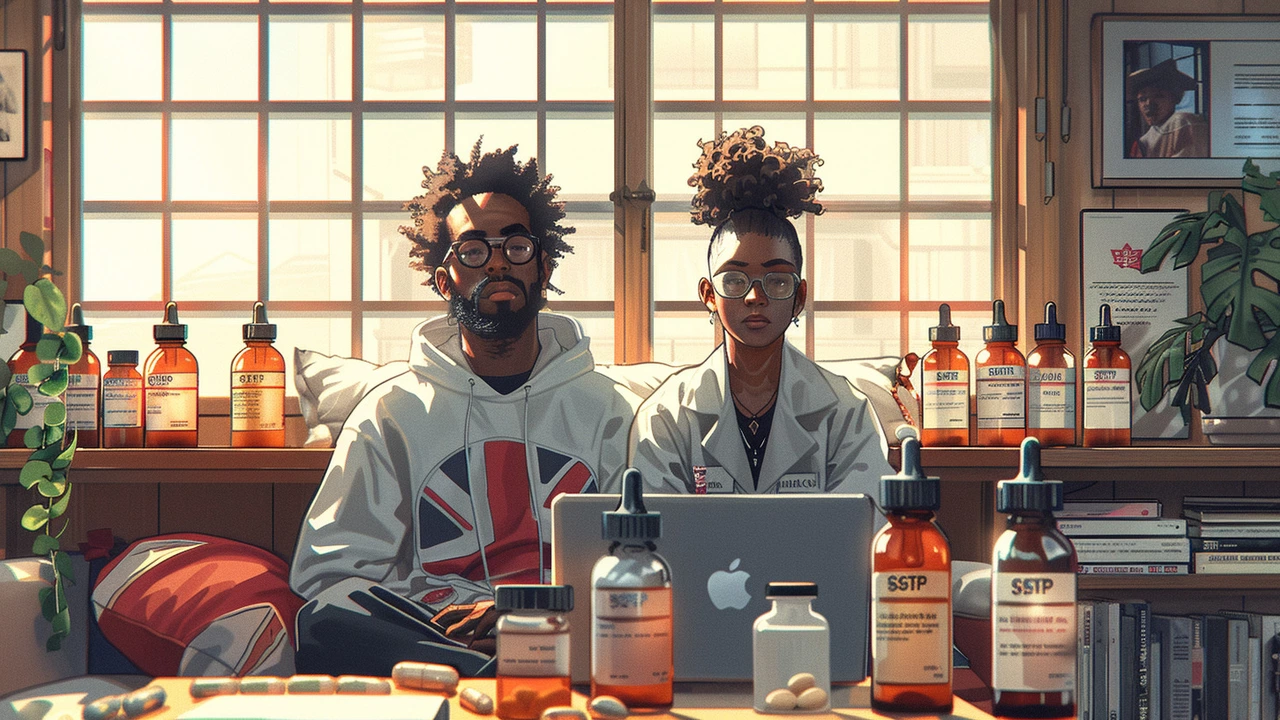Antidepressants are a lifeline for those grappling with mental health issues, but many don't realize these medications can impact more than just your mood. Specifically, your sex drive can be significantly affected. Whether you're newly diagnosed or have been on antidepressants for a while, it's essential to understand how these meds can influence your libido.
The most commonly prescribed antidepressants are SSRIs, known for increasing serotonin levels to help boost feelings of calmness and stability. While that sounds great, this rise in serotonin can also lead to a diminished sex drive. However, experiences vary from person to person, with some noticing a drop in libido and others seeing no change at all.
It's tough to pinpoint exactly how many people experience these side effects due to the sensitive nature of the topic. However, common sexual side effects for women include delayed vaginal lubrication, lack of interest in sex, and blocked orgasms. Men might face delayed orgasms, difficulties with erections, and even an inability to orgasm. Alongside these, there are non-sexual side effects like dizziness, nausea, and fatigue to consider too.
That's why it's crucial to talk openly with your healthcare provider about any changes you notice. There are several strategies to manage these side effects, such as adjusting the timing of your medication, tweaking the dosage, looking into alternative prescriptions, and weighing the pros and cons of your current regimen. Doing this can help you find a balance that supports both your mental and sexual health.
- Introduction to Antidepressants and Libido
- How SSRIs Affect Sex Drive
- Common Medications Impacting Libido
- Managing Sexual Side Effects
- Practical Tips for Balancing Medication and Sex Life
Introduction to Antidepressants and Libido
Antidepressants have become a cornerstone in the treatment of various mental health conditions such as depression and anxiety. These medications can truly be life-changing, offering a light at the end of the tunnel for those walking through the shadows of mental health struggles. However, one topic that often doesn't get as much attention as it should is how antidepressants affect your sex drive.
Understanding the connection between antidepressants and libido starts with knowing a bit about how these medications work. Many of the most commonly prescribed antidepressants fall under a category known as Selective Serotonin Reuptake Inhibitors (SSRIs). These drugs—including names like Sertraline, Fluoxetine, and Escitalopram—serve to increase serotonin levels in the brain. Serotonin is that feel-good neurotransmitter responsible for managing mood, anxiety, and happiness. While an increase in serotonin can lead to improved mood and stability, it can also come with some unexpected side effects.
One of these side effects can be a dip in sex drive. According to multiple studies, around 30-50% of people taking SSRIs report some form of sexual dysfunction. That’s a significant number, which shows just how important it is to discuss these changes openly. Dr. John Smith, a renowned psychiatrist, states, "It's crucial to have open conversations with patients about possible sexual side effects before starting an antidepressant regimen. Many people can experience these side effects but feel too embarrassed or ashamed to bring them up."
This reluctance to talk about sexual health can make it difficult to gauge just how many people are affected. And it’s not just about losing interest in sex (although that’s a big part of it); the problems can be more specific. Women might find themselves facing difficulties with lubrication or achieving orgasm, while men might struggle with maintaining erections or achieving ejaculation.
But not everyone will have these experiences. For some, taking antidepressants might not affect their sex drive at all. And interestingly enough, there are instances where people report an improved libido, perhaps because their mood and anxiety are finally under control. This variability makes it essential to personalize the discussion around antidepressants and sexual health.
One key to managing these side effects lies in understanding your own body and how it reacts to the medication. Keeping an open line of communication with your healthcare provider is incredibly important. It may also involve some trial and error, tweaking dosages, or trying different types of medication to find what works best for you.
In summary, while antidepressants like SSRIs provide immense benefits in the treatment of mental health conditions, they come with their own set of challenges. Addressing these openly and practically can help improve both mental and sexual health, ensuring a more balanced and fulfilling life.
How SSRIs Affect Sex Drive
Selective Serotonin Reuptake Inhibitors, commonly known as SSRIs, are a popular class of antidepressants widely prescribed to treat depression and anxiety disorders. These medications work by increasing levels of serotonin in the brain, a neurotransmitter associated with mood regulation. While higher serotonin levels can improve symptoms of depression, they can also have an unintended effect on your sex drive.
Serotonin is not just a mood regulator; it also plays a crucial role in your sexual function. When serotonin levels rise, it can lead to a decrease in libido. This is because elevated serotonin can inhibit the release of dopamine, another neurotransmitter that drives sexual desire and pleasure. Essentially, the increase in serotonin which helps calm the mind and stabilize mood, can ironically dampen your enthusiasm for sexual activity.
For many people, this side effect can be quite distressing. The impact on libido and sexual function varies from person to person. Some may experience a slight reduction in interest, while others might find their sexual desire significantly diminished. It's a delicate balance—one medication aiming to elevate your mood can inadvertently dampen another aspect of your life.
SSRIs like Sertraline, Fluoxetine, and Escitalopram are among the most common culprits when it comes to reduced sex drive. These medications can disrupt various sexual stages, from arousal to orgasm. Women may notice delayed vaginal lubrication, reduced sexual desire, and difficulties reaching orgasm. Men might face delayed ejaculation, trouble achieving erections, or even an inability to orgasm altogether.
The prevalence of sexual side effects from SSRIs is hard to pinpoint due to the stigma around the topic, making it less likely for people to report these issues. However, some estimates suggest that up to 50% of people on SSRIs experience some form of sexual dysfunction. This considerable percentage underscores the importance of openly discussing these side effects with healthcare providers to find viable solutions.
The severity of these symptoms often influences whether someone continues their medication. It's a balancing act between managing mental health and maintaining a satisfactory sex life. Some individuals might find the trade-off worth it, while others might seek alternative treatments. This decision is uniquely personal and often requires weighing the pros and cons alongside medical advice.
“Antidepressants, particularly SSRIs, can significantly affect sexual well-being. Open dialogue with your healthcare provider is crucial in navigating these side effects,” notes Dr. Patricia Flannery, a renowned psychologist specializing in sexual health.
Interestingly, not everyone will experience these adverse effects. For some, SSRIs can actually lead to an improved overall quality of life, including a better sex drive once their mental health issues are under control. This variability makes personal experiences essential in understanding the full impact of these medications. Regardless, being armed with information and communicating openly with your doctor can help you find a treatment plan that works for you on all fronts.

Common Medications Impacting Libido
When it comes to antidepressants, SSRIs or Selective Serotonin Reuptake Inhibitors, are often the first line of treatment for many people. These medications include well-known names like Sertraline, Fluoxetine, Escitalopram, Paroxetine, Citalopram, and Duloxetine. They're highly effective at managing symptoms of depression and anxiety by balancing serotonin levels in the brain. But this same mechanism can also lead to unintended side effects on your adultwork drive.
Sertraline, commonly marketed as Zoloft, is effective for treating depression and anxiety disorders. Still, many users report experiencing a lower libido. This is because Sertraline increases serotonin levels, which can suppress sexual arousal and delay orgasm. Similarly, Fluoxetine or Prozac, another popular SSRI, can lead to issues like delayed ejaculation in men and problems with vaginal lubrication in women.
Escitalopram, known as Lexapro, is often praised for its fewer side effects compared to other SSRIs. However, it doesn't entirely escape the risk of impacting sexual health. Users have reported a lack of sexual interest and difficulties achieving orgasm. Paroxetine or Paxil is another medication that significantly affects libido, often causing delayed ejaculation or the inability to orgasm in men. In women, there can be a noticeable decrease in sexual desire and vaginal lubrication.
Citalopram, branded as Celexa, follows a similar pattern. While it's beneficial for mood stabilization, it often comes with sexual side effects. Users can experience delayed orgasm or reduced sexual desire. Duloxetine, also known as Cymbalta, is slightly different as it functions as a Serotonin-Norepinephrine Reuptake Inhibitor (SNRI). While it treats depression and anxiety, many report similar sexual side effects such as decreased libido and difficulties achieving orgasm.
One user shared their experience, saying:
“I started taking Prozac to manage my anxiety, but after a few weeks, I noticed my desire for sex completely vanished. It was frustrating, but talking to my doctor helped me understand what was happening.”It's important to note that these medications don't affect everyone equally. Factors like dosage, individual body chemistry, and the presence of other health conditions can all play a role in how someone experiences these side effects.
Moreover, research indicates a wide range in the prevalence of these sexual side effects, making it difficult to pinpoint exact numbers. However, some studies estimate that around 30-50% of individuals taking SSRIs experience some form of sexual dysfunction. For many, these side effects can be distressing and impact their relationships and overall quality of life.
If you're experiencing these issues, it's crucial to discuss them with your healthcare provider. They might adjust your dosage, switch you to a different medication, or suggest additional treatments to help alleviate these side effects. There are also non-pharmacological strategies that can be beneficial. Open communication with your partner and seeking professional counseling can be instrumental in managing these challenges.
Managing Sexual Side Effects
Dealing with the sexual side effects of antidepressants can be challenging but it’s important to know there are ways to manage these issues. First, having an open conversation with your healthcare provider is essential. They can guide you through different strategies based on your individual needs. Don’t shy away from expressing your concerns; your sexual health is just as important as your mental well-being.
One effective approach is adjusting the timing of your medication. Taking your antidepressant after you have sex, instead of before, might help reduce the impact on your libido. This is particularly useful for drugs like SSRIs that are known to interfere with sexual function. Another option is to think about lowering the dose. A lower dose might lessen sexual side effects while still offering relief for your mental health symptoms. However, any changes to your medication should always be done under the supervision of your healthcare provider.
If changing the timing and dosage doesn’t work, you may want to explore prescription alternatives. Certain antidepressants like bupropion are less likely to affect your sex drive. Your healthcare provider can help you find a medication that suits both your mental and sexual health needs. Keep in mind that switching medications might take some time, and you may need to be patient as you find the right balance.
Monitoring your body's response is crucial. Keep a journal of your experiences to see if the adjustments make a difference. This can be useful information to share with your healthcare provider during follow-up appointments. If sexual side effects persist despite these strategies, there may be other interventions to consider. Counseling can provide additional support and help you manage the psychological aspects of these side effects. Talking with a qualified therapist can offer new perspectives and coping mechanisms, which could be very beneficial.
Another tactic is planning a timeline for sexual activity. If you know when you are most likely to feel the least impact from the medication, you can plan intimacy around these times. While this might not be a perfect solution, it can help maintain a satisfying sexual relationship. Open communication with your partner is vital here. Sharing your challenges and working together to find solutions can strengthen your bond and make navigating these side effects easier.
Physical exercise is also a helpful strategy. Regular physical activity can boost your overall well-being, including your libido. Incorporating a consistent exercise routine into your daily life can have numerous benefits. It improves your mood, increases energy levels, and enhances your overall health, which positively affects your sexual health as well. Even moderate exercise like walking or yoga can make a significant difference.
A common question is whether natural supplements could help manage sexual side effects. Some people find success with herbal supplements like ginseng, which is believed to enhance sexual function. However, it’s crucial to consult your healthcare provider before starting any supplement, as they can interact with your medication. Always prioritize safety and professional guidance.
It's worth noticing that sexual dysfunction related to antidepressants is a relatively common issue but it doesn’t have to be a deal-breaker for your overall health journey. By working closely with your healthcare provider and possibly a therapist, you can manage these side effects effectively. Making small adjustments and being open to different approaches can lead to significant improvements in both your mental and sexual health. Remember, you’re not alone in this, and support is available to help you live your life to the fullest.

Practical Tips for Balancing Medication and Sex Life
Finding the right balance between managing your mental health and maintaining a healthy sex life can be tricky, but it’s not impossible. Here are some practical tips that could help you navigate this complex issue.
Adjust the Timing of Your Medication
One effective strategy is to adjust the timing of your medication. Taking your dose at a different time of day can sometimes help minimize sexual side effects. For example, if you take your antidepressant in the morning and experience a loss of libido or difficulty performing later in the day, consider discussing with your healthcare provider about taking it at night instead.
Tweak the Dosage
Another option is to tweak the dosage. Sometimes, decreasing the dose slightly can reduce side effects without compromising the medication's effectiveness. This must be done under medical supervision, so make sure to talk to your doctor before any changes.
Plan a Timeline
Planning a timeline for your sexual activities can also prove beneficial. Knowing when your body is likely to be least affected by the medication allows you to schedule intimate moments during those windows. This may require some trial and error, but it can certainly improve the quality of your sex life.
Discuss Prescription Alternatives
If the side effects are too disruptive, don’t hesitate to ask your doctor about alternative prescriptions. Sometimes, switching to a different antidepressant can make a world of difference. Medications like Bupropion are known to have fewer sexual side effects. Again, always consult your healthcare provider before making any changes.
Weighing Pros and Cons
Reflect on the pros and cons of your current antidepressant regimen. While the side effects can be challenging, the benefits of improved mental health could outweigh the downsides. Make a list of what you’re gaining versus what you’re missing and discuss these points with your doctor for a more balanced perspective.
“Open communication with your healthcare provider is crucial. Many patients suffer in silence without realizing there are multiple strategies to manage side effects effectively.” – Dr. Jane Morrison, Psychiatrist
Non-Medical Strategies
Incorporating non-medical strategies can also help alleviate some of the sexual side effects. Regular exercise can boost your mood and improve overall circulation, which might translate into better sexual function. A healthy diet rich in fruits, vegetables, and lean proteins can also make a difference over time.
- Relaxation techniques: practices like yoga or meditation can reduce stress and anxiety, enhancing your sexual experience.
- Open Communication: Keep the lines of communication open with your partner. Having an honest conversation about your struggles can strengthen your relationship and help both of you find solutions together.
- Use of lubricants: over-the-counter lubricants can alleviate discomfort for women, making sexual experiences more pleasant.
- Professional Counseling: Sometimes, sex therapy or couples counseling can offer additional support and techniques specifically targeted at improving intimacy.
Balancing the needs of your mental and sexual health is a multifaceted challenge. By using these practical tips, you can find a middle ground that allows you to enjoy both aspects of your life more fully. Remember, you’re not alone in this journey, and there are numerous resources and strategies available to help you.





